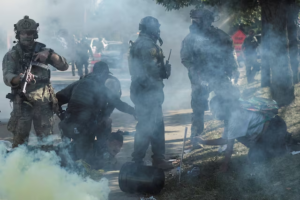The Trump administration is coming under mounting scrutiny after it was revealed through federal records that it intends to redirect substantial counterterrorism money from Democratic-leaning states to Republican-leaning states. The move, one of a number of prominent shifts in the $1 billion Homeland Security Grants Program, has led to lawsuits by more than a dozen Democratic state governments accusing the White House of employing security money as a political tool.
The program, created after the September 11, 2001, terrorist attacks, is designed to assist states and cities in fortifying their anti-terrorism and other mass-threat defenses. But according to critics, the Trump administration is playing games with the formula for distributing funds to reward states that voted for him in the 2024 election — and penalize those that didn’t.
Democratic States Launch Legal Fight Over “Politically Driven” Cuts
12 Democratic state officials sued this week, arguing the administration’s cuts to their allocations are illegal and detrimental to national security.
The states allege the cuts are retaliatory and are linked to their refusal to cooperate in federal efforts to enforce immigration law, which Trump has made the foundation of domestic policy.
“Public safety should never be politicized,” Illinois Attorney General Lisa Madigan stated in a statement announcing the suit. “This administration is prioritizing preparation over politics and putting millions of Americans at risk.”
Funding Shift Aids Key Republican Bastions

Federal documents received by Reuters show that the Federal Emergency Management Agency (FEMA) and the Department of Homeland Security (DHS) quietly updated state funding estimates in late September — weeks after preliminary reports had been submitted to state officials.
The revised allocations show steep increases for Republican-controlled states such as Wisconsin, North Carolina, and Ohio, all of which Trump won in 2024. Wisconsin’s boost at the top was over 40% from earlier projections.
On the other hand, strongly Democratic states and territories saw some of the deepest cuts:
Washington, D.C. funding dropped 70%
Illinois reduced by 69%
New Jersey dropped by 49%
California, the state with the largest population, saw its funding cut by 31%
Some Democratic governors have accused the administration of acting deliberately against states that have challenged Trump’s immigration efforts or criticized his handling of the 2024 government shutdown.
DHS Defends Choice: “Changes Are Based on Risk, Not Politics”
A DHS official dismissed the criticism as “flatly untrue,” saying the funding reductions were made on the sole basis of shifting national security threats.
“The new equation places greater emphasis on transnational organized crime and risk from illegal cross-border activities,” the spokesperson stated, noting federal analysts considered threat data from the U.S.-Mexico border and international crime organizations to establish new funding priorities.
DHS also said the revisions are “a thoughtful, risk-informed analysis” and included that the administration seeks to “maximize returns for every dollar invested in the interest of the American people.”
However, many state officials are unconvinced, arguing the administration’s “risk assessment” has the convenient tendency to favor politically favored regions.
A Wider Pattern of Political Retaliation?

The row follows a series of budgetary decisions disproportionately affecting Democratic-run states. The Trump government in recent months cut billions in federal infrastructure and energy aid to states like New York and California, in a move that followed up on Trump’s earlier threats that his government would “rethink” aid to states that oppose his policies.
Experts add that the trend is reflective of Trump’s overall style of governing: using budget appropriations as leverage to attract allegiance and scare critics.
“The White House is politicizing the federal budget, from immigration enforcement raids to disaster relief, and now to counterterrorism funding,” said Dr. Maya Richardson, a senior fellow at the Center for Public Integrity. “It’s a concerning precedent for how future administrations might treat critical security programs.”.
Federal Court Blocks Trump’s Deployment of Troops in Illinois
On another front, a Chicago federal court on Thursday temporarily blocked Trump’s attempt to deploy hundreds of National Guard troops in Illinois as an “overreach of executive authority.”
The decision is one of the growing number of legal denials the administration is facing from Democratic states accusing the president of misuse of emergency powers for political reasons.
Illinois Governor J.B. Pritzker applauded the ruling as “a win for state sovereignty,” and stated the administration’s actions “undercuts public confidence and misuses federal security funds.”
What’s Next?
The court battles could take several months to unfold, but the political fallout is already manifesting in Washington. Congressional Democrats are calling for an investigation of whether the Trump administration violated federal appropriations law or was in contempt of Congress.
Meanwhile, DHS says it will continue with the new allocations unless a federal court injunction halts the process. FEMA officials are scheduled to finish state grant awards by the end of the fiscal year.
As the two sides prepare to clash in court, one thing is clear: the battle over how America finances its war against terrorism has once more turned into a partisan battleground — with national security caught in the middle.




